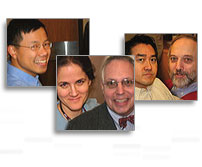
| | Collaborations | | International Antidepressant Response Consortium | | |||
| | |||||||
| |
1. Background Response to antidepressant treatment in major depressive disorder appears to be familial, raising the possibility that genetic variation may contribute to interindividual differences in treatment response. Identification of vatiations which influence treatment outcome, whether in terms of efficacy, safety, or tolerability, could allow for better matching between patients and treatments most likely to be effective for them, and ultimately facilitate the development of novel treatments. With the proliferation of genomewide association studies (GWAS), it is increasingly apparent that the dangers of both type I and type II errors in genetic association studies are substantial. One obvious solution is larger samples sizes and the use of replication cohorts, followed by pooling or meta-analytic techniques. Given the particular difficulties in systematically obtaining outcomes data sufficient to adequately define treatment response phenotypes, the need for groups to work together to collect and study these cohorts is particularly great. Therefore, the goal of this collaboration is to facilitate high-quality, well-powered analysis of antidepressant treatment response data. This memorandum of understanding will set out the principles guiding such a collaboration. While the availability of genomewide data facilitates these efforts, it is not a requiremnt for participation in this group, provided groups without GWAS data are open to considering additional genotyping in their cohorts. Thus, this consortium neither requires, nor precludes, participation in other collaborations. 2. Specific Aims At present, aims of the consortium will include: 1. Develop a set of summary descriptive statistics for each antidepressant-response cohort, including cross-sectional and longitudinal features. 2. Define primary treatment-response phenotypes to be used in intial efforts across studies. 3. Determine heterogeneity in outcomes across studies and sites. 4. Establish a framework for genotyping individual cohorts, and combining results, which will maximize quality control and ensure consistent genotyping where multiple sites are involved. 3. Consortium Members Through conversations amongst ourselves and our collaborators, the members of this group identified major cohorts of antidepressant-treated patients for whom DNA is available and in whome treatment response may be defined. Bonn-Mannheim (Thomas Schulze) Christchurch (Peter Joyce, Martin Kennedy) Edinburgh (Douglas Blackwood) GENDEP (Rudolf Uher) Mass General/i2b2 (Roy Perlis) Muenster (Katharina Domschke) Munich (Stefan Kloiber) NESDA/ATR (Brenda Penninx) STAR*D (Bonzalo Laje, Roy Perlis) Psychiatric Genomewide Association Study Consortium (Patrick Sullivan) 4. Adding other sites/investigators The goal of this consortium will be to maximize inclusiveness of sites, given the scarcity of antidepressant response pharmacogenetic data. As such, the committee will work to identify additional sites for inclusion, and to encourage the collection of new cohorts for study. Decision about which groups will be invited will be made by group consensus. The involvement of non-academic groups (e.g., pharmaceutical companies) will be considered as with all other groups on a case-by-case basis. 5. Contact Information For further information about ARC, including information about membership, contact: Roy Perlis, MD, MSc (rperlis <at> partners <dot> org)
| |||||
| | ||||
| | Home | Contact | Sitemap | Search | ©2026 i2b2 TranSMART Foundation | | |
| | | | | |

